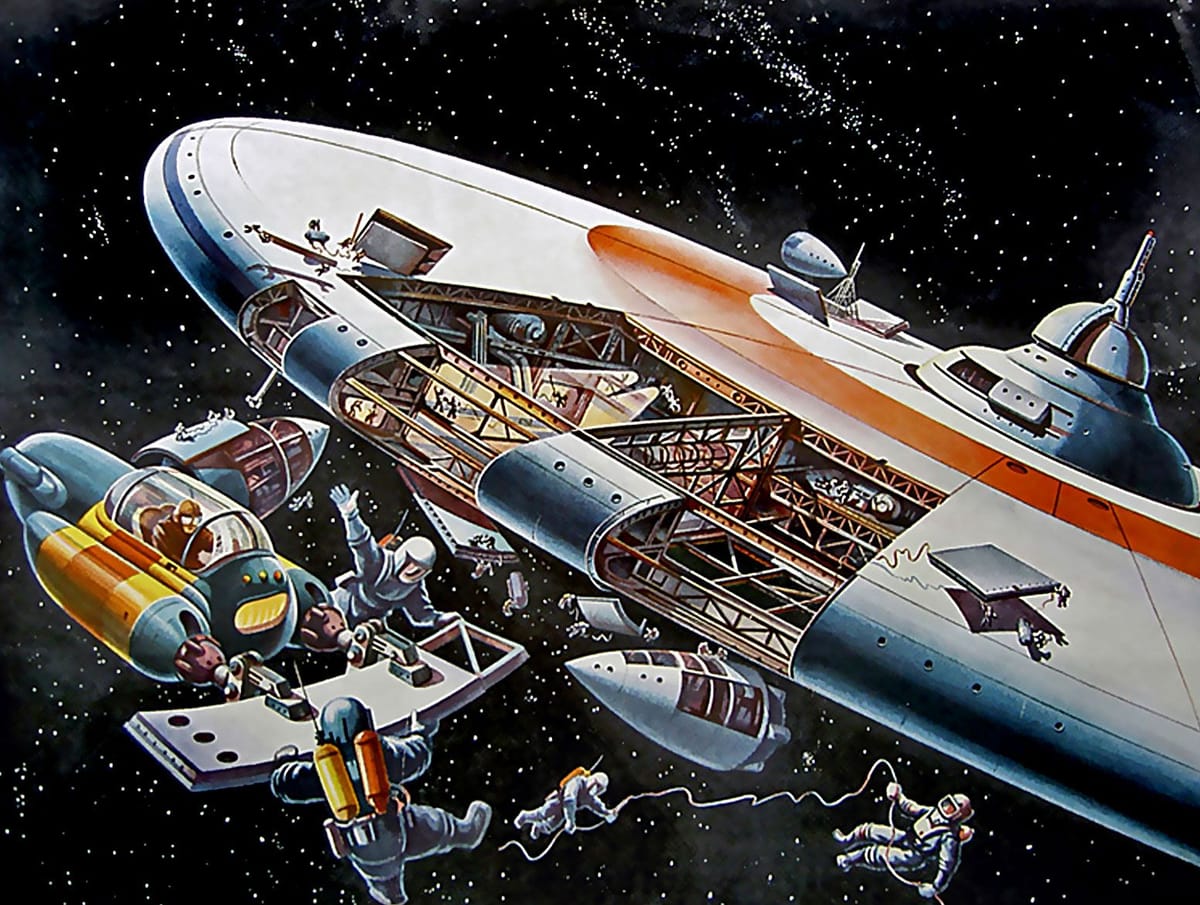Today on Project Gutenberg: "Last Night Out"
The warzone is thousands of light years away. Try not to get murdered before you're shipped off.

Today on Project Gutenberg, we have…
Last Night Out by Milton A. Rothman
One of my favorite things to stumble across in Project Gutenberg is old science-fiction stories. In addition to classic sci-fi novels from the 19th and early 20th centuries, Gutenberg also hosts a wide selection of short stories from Weird Tales, Amazing Stories, Science Fiction Adventures and other pulp magazines that thrived from the 1920s to the 1950s. Most of the works published in those magazines did not have their copyright renewed, meaning that they reverted to the public domain decades ago.
One such story is the one I'm spotlighting today. It's called "Last Night Out," and PG helpfully informs us that it was originally published in the September 1951 issue of a magazine called Planet Stories. The author is listed as Lee Gregor, but that wasn't his real name; it was the pseudonym of a nuclear physicist and professor named Milton A. Rothman. When Rothman wasn't teaching, worked on nuclear fusion or writing books like The Laws of Physics, he was writing sci-fi tales under his pen name and organizing some of the first science-fiction conventions. One of the events he managed, the 1953 Philcon, was the site of the very first Hugo Awards.
"Last Night Out" belongs to the subgenre of military science-fiction, which predated the 1950s but started to truly thrive in that decade. Although still popular today, the genre doesn't always enjoy a pristine reputation. It often gets stereotyped as stories about square-jawed Earthling men using futuristic weaponry to wage glorious war upon fearsome alien enemies, happily indulging in fascist ideology the whole time. "Last Night Out," however, has very little in common with that image; after all, it was published eight years before Robert Heinlein's Starship Troopers created the modern trappings of the genre. In this story, the great interplanetary war is a distant thought compared to the tensions and conflicts unfolding on the home front.
At some point in the future, humans (or "Terrans") have united under a single government and reached out into the stars, colonizing planets and making contact with alien species. At the edge of the "civilized galaxy," trouble appear in the form of a mysterious enemy—its form and intentions are never elaborated on. A young man named Jed Grey is conscripted to serve in the Terran military, and the examiners' tests reveal that he possesses telepathic abilities. Thus he is assigned to work with a member of the Canopans, a superintelligent alien species that communicates through telepathy. Jed and his new partner Joe (a chosen Terran name, as his true one is unpronounceable) eventually form a close and intimate friendship, one in which feeling each other's thoughts and emotions becomes second-nature. But when they venture outside their base for some fun in town on the night before their deployment, they both receive a brutal reminder that humanity at large does not take kindly to the idea of aliens among them.
Though sci-fi stories are almost always set in the future, the best ones have something clear and important to say about the time in which they are written. For Milton Rothman, that time was in the midst of the Korean War and a few years after the official desegregation of the United States Armed Forces. Do I know for a fact that this story is intended as an integration metaphor? No, I do not. But can it be interpreted that way? Yes, I believe so.
First off, the world that Rothman creates is no Star Trek-style utopia where we see humans and aliens living in harmony with one another. From the first sentence on, there's real tension and danger in the protagonists' situation. The humans certainly don't enjoy sharing a street with creatures not from Earth, and the aliens are well aware of how much danger they're in.
Jed Grey knew precisely how bad it was. Habitually en rapport with his Canopan partner, he sensed in every nerve the hostile atmosphere of the street, tearing at the hard shell of defense which he had learned to erect.
The Arcturians, habitually suspicious of strange planetary types, were sufficiently unpleasant in their thought patterns. However, it was from the native earthmen, whose blue uniforms vastly outnumbered all others, that the bulk of the torment arose.
Grey could sense it even though he avoided observing their faces. He could feel the alcoholic thoughts of the mechanic across the street: "An earthman holding hands with a snake! Damned snake man!"
It was now months since Grey had learned what that meant. The pain with which he had learned that was by now gone. He did not think that Joe's tentacles looked like snakes, and he cared nothing for the opinions of the others. Yet it was difficult to keep out of his mind the intruding thoughts of the Fleetmen who glared at him with disgust on their faces.
…
Making their way through the crowded street was no longer the ordeal which it had been when Jed Grey and Joe had first been assigned to work together. By this time it no longer turned Grey sick when a highly-painted female hysterically turned around and whined: "It's reading my mind! The damn snake's reading my mind!"
Despite the fantastic elements here—the appearance of the Canopans, the presence of telepathy—it's not difficult to imagine a scene like this playing out in 1950s America with a White and a Black soldier walking down the street together. The angry stares and remarks, the heightened sensitivity to your surroundings, the knowledge that a single accusation screamed loud enough could ignite a powderkeg of violence…which, of course, it eventually does.
The metaphor can also be spotted when Jed and Joe find themselves in a bar where other Canopan soldiers have congregated. The music "heaved with the beat of something which was part American jazz, part Sirian drum-music, with a flavor of strains from half a dozen other star-systems," and the friendly bartender, himself a telepath, is "as black as space itself." Here they enjoy a brief respite, a place where they both can hide away from the bigotry they face and share an appreciation for each others' cultures. Just as the Canopans delight in Earthling jazz and cigarettes, Jed begins to understand how the Canopans' unique physiology and abilities shape their ideology and the ways they interact with the world. The peacefulness of the bar scene doesn't last, but it offers a glimpse of how the society Jed and Joe inhabit could someday attain a positive coexistence between species. It's a bright moment in a story that's otherwise pretty cynical.
The way that "Last Night Out" tackles the subject of war is fascinating to me. Rather than the jingoism you might expect from it, the story treats its galactic conflict with ambivalence and even outright negativity sometimes. Rothman describes the war in only the vaguest of terms; this is likely because the exact geopolitics aren't really important to the story he wants to tell, but it also lends ambiguity to the war effort and how noble or necessary it actually is.
It had been slightly more than a year ago that the first enigmatic events had been noticed in a corner of the galaxy which was just newly being explored and developed. Ships had failed to return—colonies had ceased communicating with their prime bases…Gradually it developed that the civilized galaxy was rapidly becoming immersed in a struggle for existence against an enemy whose character was initially somewhat obscure, but whose unfriendly aims were quite definite.
It becomes clear later on that the nature of this enemy is a tightly guarded military secret. So while it might be a genuine threat, it could just as easily be something else, like a colonial uprising that the government is sending soldiers to suppress.
Regardless of its purpose, the focus of the story is not on the actual war but on the shadow it casts over the lives of their protagonists. Jed, for example, sees the effects of the war creeping up all around him until he's finally pulled into the military machine:
Overnight, it seemed to Grey, Terra flew into a turmoil of mobilization, manufacture of spaceships and weapons, research for the creation of new weapons and new defenses against the strange attack methods of the enemy. In the tiny circle of existence in which he walked, that which he observed was the increased crowds of people on their way to work in the factories, the increased difficulty of buying various items, and inevitably the card which had ordered him to the mobilization center.
For the Canopans, the war is an even more distant matter. It's left ambiguous how willing they really are as participants, since the narration describes them "being brought to Earth by the thousands" to perform maintenance on Terran spaceships. The Canopans' intelligence makes them well-suited for such a job, but it's not the type of work their culture values, according to Joe:
"We're really not very interested in electronics and such things," Joe replied. "We put up with this as a rather unhappy necessity, but our creative instincts do not lie in that direction. Since we have developed without hands, and with a brain of capabilities which are strange to you, our culture has become more introspective—more interested in the being within than in the things without—more interested in creating things of beauty to perceive rather than machines of complexity for the control of nature."
In the main narrative of the story, the war is a looming inevitability that poses both a physical and an existential threat to the protagonists. Obviously there is the threat of death faced by anyone heading into an active war zone. But a more sinister threat makes itself known as well—the threat of moral corruption, of acquiring a desire to commit violence. The fights which happen across the story, and the attacks against Joe in particular, are instigated by human soldiers, specifically ones who are said to have just returned from the front.
"There's a brawl down the street," Joe informed Grey. "Some of our heroes back from the battle sector feel that they haven't had enough fighting."
"I bet you a pack of smokes that the guys in the fight haven't been within a light year of an actual battle," said Grey, dryly. "They're the ones who always try to make like tough heroes when they get back."
All of this combined paints a rather unflattering picture of the conflict, one that mirrors contemporary Americans' reactions to the conflict that they were involved in. Sending US soldiers to defend South Korea was viewed favorably when the Korean War began in 1950, but as a 2002 article from Gallup shows, opinions became more divided the following year. 43% of polled Americans said they thought the war was a mistake when Gallup asked the question in June 1951—around the time that Rothman would have been writing this story. That sense of uncertainty runs deep throughout the narrative, culminating in an ending that leaves you with more questions than answers about the situation Jed and Joe are about to walk into—what will they encounter when they reach the warzone, and have their superiors not been truly honest about the purpose they are meant to serve?
"Last Night Out" is another example of how Project Gutenberg can helped you find engaging stories that, for one reason or another, have been forgotten by time. This is an intelligent little work of sci-fi that balances fantastical descriptions of alien species and telepathic powers with sharp commentary and harrowing scenes that evoke the real-world social issues of the time. It accomplishes a lot in a few thousand words, and I think it's well worth your time.
And that's what we found today on Project Gutenberg. See you next time!
—Dana




